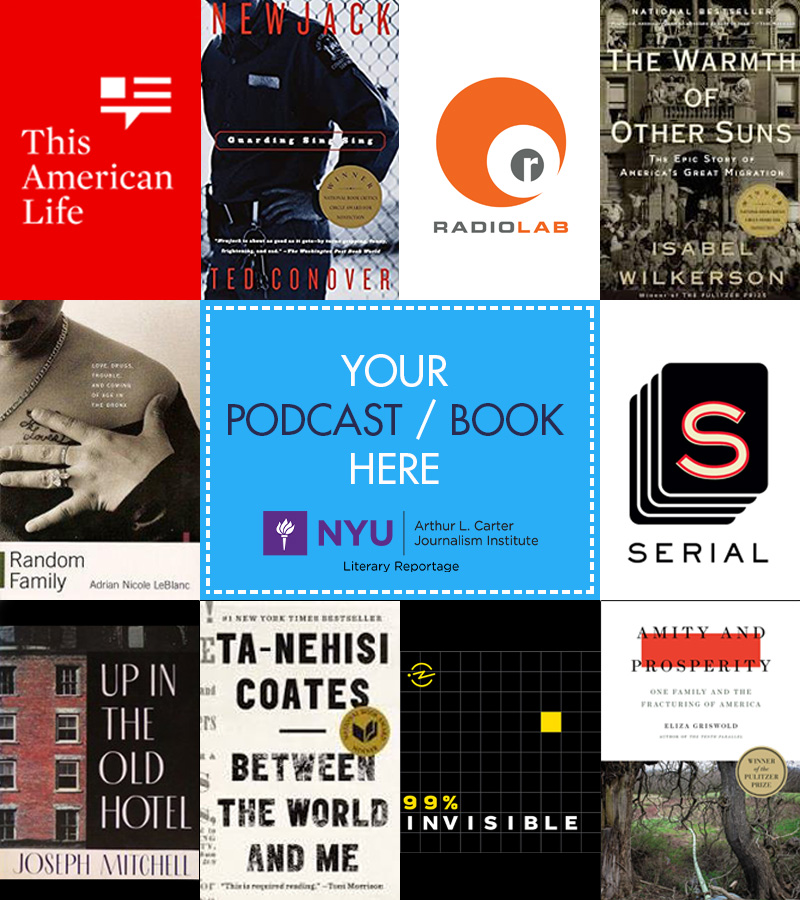About LitRep

About the Program
Journalism schools produce good reporters; MFA programs train beautiful writers. The Literary Reportage program combines the best of both. And, as of 2020, our students will receive an MFA, rather than an MA. Other than the degree, nothing about the program will change. The MFA is merely recognition of the merits and methods of the existing program. One advantage of an MFA is that it is a terminal degree, recognized as a teaching credential by nonfiction MFA programs.
At Literary Reportage, we will teach you how to transform your passions into well reported, thoroughly researched, beautifully expressed journalism. Literary Reportage students pursue their own long form projects, mentored by veteran writers in reporting classes and seminars.
We’ll teach you how to do what Tom Wolfe once termed “stylish reporting,” how to master the art of the interview, and then go beyond it. We have a much more expansive, ethnographic approach to reporting than most other journalism programs. Literary Reportage students cover every subject imaginable: a meditation on the nature of trails; an exploration of the underground world; an investigation of the political and real estate corruption behind the construction of Yankee Stadium; the search for a New York writer who vanished half a century ago. Perhaps you will become a participant-observer in order to tell the inside story. Or maybe you have a strong personal connection to your story, and choose to fashion it as a kind of memoir. Or maybe your advantage will come from the intensive research you do, whether in government archives or libraries.
We embrace all forms of nonfiction, particularly print and audio. Literary Reportage distinguishes itself from other MFA programs by stressing the value of examining personal experience through the reporting and research that comes from the world outside one’s head. That way, when you sit down to fashion your narrative, you’ll have a richer set of materials to work with, and a greater chance of publishing your work in professional venues, whether while at NYU or beyond. The Literary Reportage faculty and alumni network will introduce you to editors at every publication imaginable. So far, the program has produced five books, each of which came directly out of the participant’s final thesis.
How do you apply? You will submit a sample of your existing work (articles, blogs, videos, podcasts, essays–published or not), and a description of the kind of project you want to pursue while at NYU. Your passions and obsessions are valuable, they are what make for good writing. We want to hear know more about them. Think big, but also think concretely: What particular works or authors have inspired you and your project? What journalistic forms could you imagine it taking? What models do you have in mind? We don’t care if you change your mind later – experimentation is part of the idea. Your project will become clearer once you’ve worked on it with our faculty and your colleagues.
Projects can be local, national, or international in scope. But since much of your reporting will be done while in residence at NYU, your project should have some kind of a NYC dimension. Some students divide their time between their final international or national project and its local iterations. A lot of travel and reporting can be accomplished during summers and other breaks, and we offer travel/research grants to help you.
We encourage you to pursue a project in whatever form you like. Some Literary Reportage students want to write books and articles, while others produce audio podcasts. You will learn how to work in all of these forms. Much of the best literary reportage today is appearing on audio podcasts like This American Life, Serial, 99% Invisible and Radiolab. And there have never been so many opportunities to publish, and get jobs, in the podcast world. We have integrated audio storytelling into the program, and every Literary Reportage student takes two week-long audio crash courses–one immediately before the start of the fall semester, and another immediately before the start of the spring semester. We also offer semester-long audio courses and free weekend skills courses throughout the year. But the most important thing we teach is how think in terms of “stories.” Rigorously reported, well-researched, imaginative, artfully written stories.
How does Literary Reportage work?
The courses are divided between seminars and workshops. The first semester leans toward the former, while the remaining semesters leans toward the latter. For an overview of the curriculum click here.
Literary Reportage became a full-fledged concentration in 2009, growing out of the Portfolio honors track, in which students learned how to build a coherent body of work over the course of two semesters. It worked well, and we suspected it would work even better if students applied with projects already in mind and had more time to complete their work.
How does Literary Reportage differ from other the Journalism Institute’s other programs? Our applicants must apply with a project in mind and, produce a master’s project in their fourth and final semester.